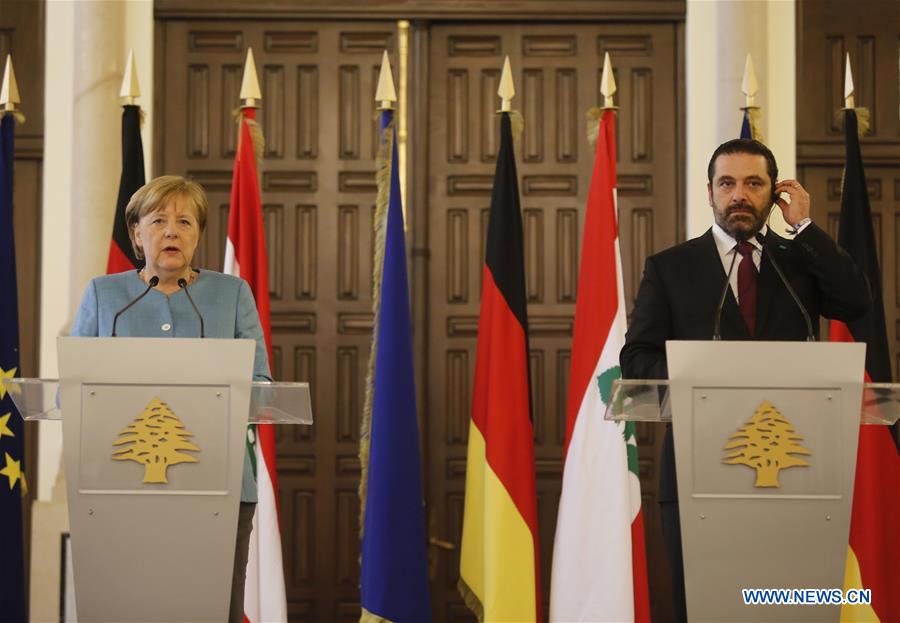
Visiting German Chancellor Angela Merkel (L) attends a joint press conference with Lebanese Prime Minister Saad Hariri at the Grand Serail in Beirut, Lebanon, June 22, 2018. (Xinhua/Bilal Jawich)
BEIRUT, June 22 (Xinhua) -- German Chancellor Angela Merkel and Lebanese Prime Minister-designate Saad Hariri agreed Friday on the need to secure a safe return of Syrian refugees to their homeland in coordination with humanitarian organizations.
"We want to reach a political consensus to secure a safe return of Syrian refugees to their country," said Merkel. "Refugees' return to Syria should happen in an organized way and in coordination with humanitarian organizations," she added.
Hariri reiterated Merkel's comments, saying that the only solution for Syrian refugees is to secure their safe return to their homeland.
"This is a humanitarian issue and we should deal with it as such," he said.
These remarks came during a joint press conference during Merkel's two-day official visit to Lebanon aimed at holding discussions with Lebanese officials on various topics ranging from Syrian refugees to the potential of joint economic projects between the two countries.
Hariri assured that his country accepts aid from other countries to support refugees in Lebanon but it does not do so in the aim of nationalizing Syrian refugees.
"Our Lebanese constitution does not give the right to nationalize Syrian refugees in Lebanon," he said.
"This is why we have to work with the international community to secure a safe return of refugees to their homeland," Hariri said.
According to Human Rights Watch, more than 1 million Syrian refugees are registered with the United Nations High Commissioner for Refugees (UNHCR) in Lebanon. The government estimates the number of Syrians in the country to be actually at 1.5 million.
Political parties in Lebanon have, on many occasions, voiced their concerns about the large number of refugees in the country, saying that their prolonged stay represents an economic and social burden.
However, the strongest stance regarding the issue came from Caretaker Foreign Minister Gebran Bassil who ordered a freeze on the renewal of UNHCR staff residency permits, accusing them of stopping refugees from returning to their homeland through a series of warnings.
According to a statement issued by Lebanon's Ministry of Foreign Affairs, the UNHCR said the refugees would be obliged to join the military and that the agency will cut off aid to them because their return won't take place under international support.
The UNHCR Representative in Beirut Mireille Gerard told Al-Akhbar daily Wednesday that her agency does not intend to make any decisions on behalf of refugees and it does not encourage them to stay in camps because this does not preserve their dignity.
"Around 90 percent of refugees want to go back to their homeland because their situation in Lebanon is getting worse day after day," she said.
On the other hand, Hadi Hashem, foreign ministry chief of cabinet, told the Daily Star Thursday that the foreign ministry received a letter from UNHCR saying that the agency will "encourage a voluntary return of refugees and work with its team inside Syria to remove obstacles endangering those who wish to return."
At the press conference on Friday, Hariri emphasized the need to deal with the issue of Syrian refugees in a delicate way. "We do not want to disregard the humanitarian side of the issue," he said.
Hariri also highlighted the need to grow the Lebanese economy in a bid to be able to host this big number of Syrian refugees. "This is why we participated in CEDRE. We want to grow our economy and create job opportunities for the Lebanese in the first place," he said.
On April 6, France hosted in Paris the international conference in support of Lebanon development and reforms, the CEDRE conference.
Lebanon secured over 11 billion U.S. dollars in soft loans and grants from international donors at CEDRE to revamp its ailing infrastructure and bolster its economy.
Lebanon pledged to start with important reforms ahead of CEDRE that would mainly target the electricity sector, which, once implemented, would potentially save around 2 billion dollars of government money annually.
Merkel said that Germany will help Lebanon in implementing its reforms.
"We expect the Lebanese to fulfill their promises by implementing the needed reforms and creating more growth," she said.
Merkel landed in Lebanon on Thursday after concluding an official visit to Jordan where she promised a loan worth 100 million dollars.
The German chancellor also met with Parliament Speaker Nabih Berri on Friday who emphasized the need for greater collaboration with the German government to solve the Syrian refugee crisis.
Merkel is expected to meet President Michel Aoun before she heads back to Germany.